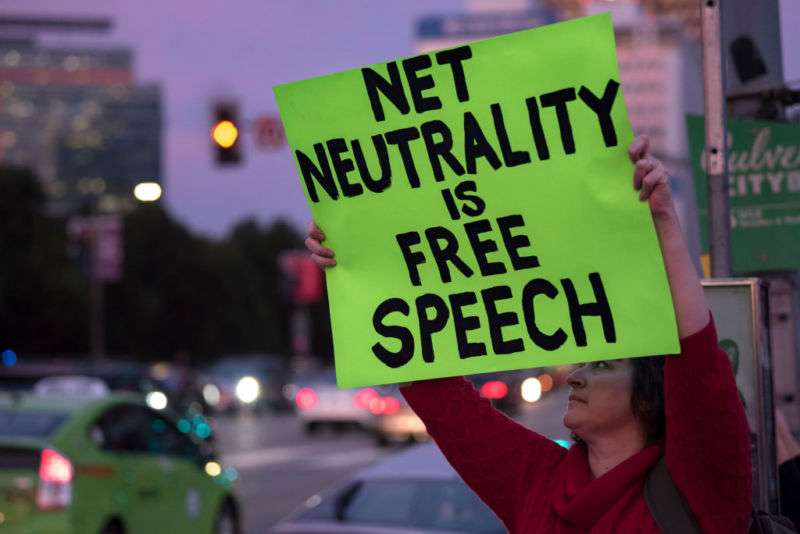
Calif. enacts net neutrality law—US gov’t immediately sues to block it [Updated]

California Governor Jerry Brown today signed net neutrality legislation into law, setting up a legal showdown pitting his state against Internet service providers and the US government.
The California net neutrality bill, previously approved by the state Assembly and Senate despite protests from AT&T and cable lobbyists, imposes rules similar to those previously enforced by the FCC.
“While the Trump administration does everything in its power to undermine our democracy, we in California will continue to do what’s right for our residents,” California State Senator Scott Wiener (D-San Francisco), author of the net neutrality bill, said today.
California’s legal authority to impose its own net neutrality rules will be tested in court. The FCC’s recent repeal of federal rules said that states aren’t allowed to impose net neutrality rules, and FCC Chairman Ajit Pai called California’s net neutrality bill “illegal.”
US Department of Justice officials said they will sue California to block the net neutrality rules, The Washington Post reported. A DOJ lawsuit is expected to be filed on Monday morning. DOJ officials told the Post that “they would take the state to court on grounds that the federal government, not state leaders, has the exclusive power to regulate net neutrality,” the paper reported. “DOJ officials stressed the FCC had been granted such authority from Congress to ensure that all 50 states don’t seek to write their own, potentially conflicting, rules governing the Web.”
(UPDATE: The Justice Department filed its lawsuit against California Sunday night, the department announced. “Under the Constitution, states do not regulate interstate commerce—the federal government does,” Attorney General Jeff Sessions said in a statement. “Once again the California legislature has enacted an extreme and illegal state law attempting to frustrate federal policy. The Justice Department should not have to spend valuable time and resources to file this suit today, but we have a duty to defend the prerogatives of the federal government and protect our Constitutional order. We will do so with vigor. We are confident that we will prevail in this case—because the facts are on our side.” Pai issued a statement praising the Justice Department’s lawsuit against California.)
Specifically, the new California state law prohibits Internet service providers from blocking or throttling lawful traffic and from requiring fees from websites or online services to deliver or prioritize their traffic to consumers. The law also bans paid data cap exemptions (so-called “zero-rating”) and says that ISPs may not attempt to evade net neutrality protections by slowing down traffic at network interconnection points.
Net neutrality “is the basic notion that we each get to decide where we go on the Internet, as opposed to having that decision made for us by Internet service providers,” Wiener said. “It’s also about ensuring a level playing field for ideas and for businesses trying to compete.”
FCC preemption powers will be tested
A lobby group for AT&T and Verizon has also threatened to sue states that impose net neutrality rules.
But the FCC’s power to preempt state laws isn’t unlimited. The FCC previously tried to preempt state laws that restrict the growth of municipal broadband networks, but a federal appeals court struck down that FCC decision in 2016.
The FCC decision to kill net neutrality rules also classified broadband as an information service instead of a telecommunications service, and Pai argues that states cannot regulate information services.
But supporters of state rules say that the FCC abandoned its regulatory authority over broadband and, thus, cannot preempt state broadband laws.
“Since the FCC says it no longer has any authority to protect an open Internet, it’s also the case that the FCC lacks the legal power to preempt states from protecting their residents and economy,” Wiener recently said.
The FCC repeal of federal net neutrality rules is also being challenged in a lawsuit filed by state attorneys general, consumer advocacy groups, and tech companies. That lawsuit seeks to reinstate the federal net neutrality rules but also challenges the FCC preemption of state laws.




